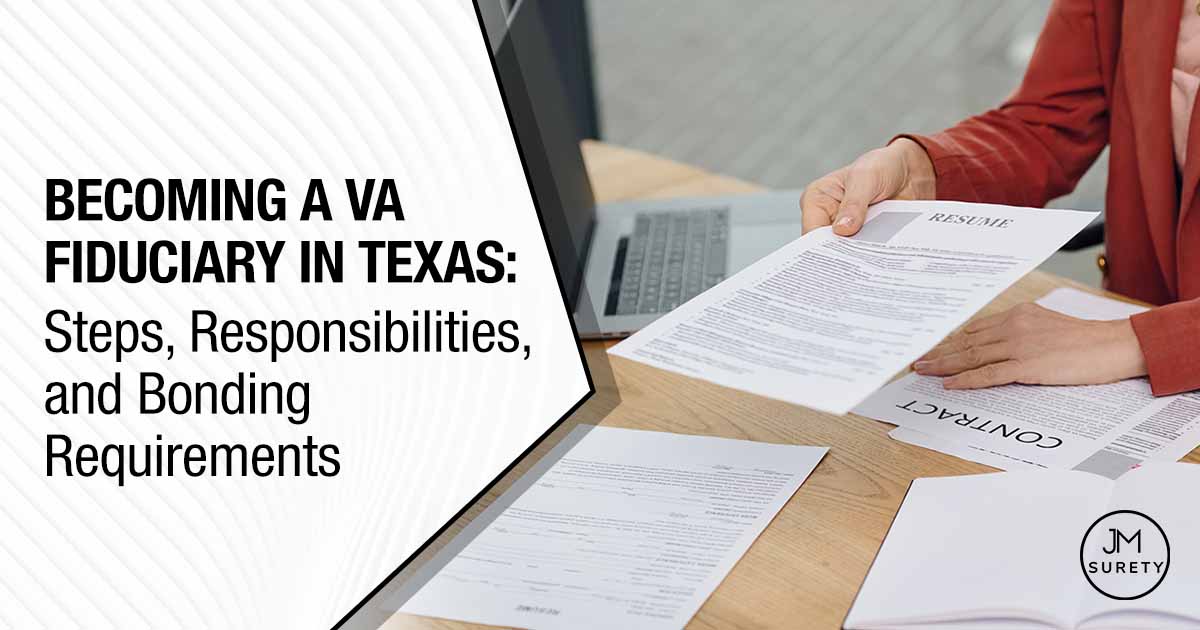What is a VA-appointed fiduciary in Texas?
A VA-appointed fiduciary in Texas is vital in helping veterans manage their financial benefits. When veterans are deemed unable to handle their financial affairs due to a mental condition, disability, or other circumstances, the Department of Veterans Affairs (VA) appoints a fiduciary to ensure their funds are handled responsibly.
One crucial aspect of this role is obtaining a VA Fiduciary Bond. This bond is a financial safeguard, protecting veterans’ funds from mismanagement and ensuring the fiduciary fulfils their legal obligations.
Who Needs a VA Fiduciary in Texas?
Veterans Requiring Assistance
A VA fiduciary is necessary when:
- Veterans are deemed incompetent due to a mental condition or disability rating.
- Medical evidence or a VA field examiner’s assessment confirms the veteran’s inability to manage finances.
Beneficiaries Needing Financial Representation
In some cases, veterans’ family members, court-appointed guardians, or representative payees may serve as fiduciaries to ensure their loved ones’ financial needs are met.
Steps to Become a VA Fiduciary in Texas
Step 1: Application Process
To begin, prospective fiduciaries must apply through the VA Fiduciary Program. This involves submitting:
- Evidence of the veteran’s incapacity (e.g., medical evidence).
- If applicable, any legal documents, such as a durable power of attorney.
Step 2: Field Examination
The VA conducts a field examination to assess the applicant’s ability to serve as a fiduciary. A field examiner evaluates:
- The applicant’s financial management skills.
- Their relationship with the veteran and understanding of fiduciary duties.
Step 3: Appointment and Bonding Requirements
Once approved, the VA formally appoints the fiduciary. The fiduciary must then secure a VA Fiduciary Bond, a legal requirement to protect the veteran’s assets.
Responsibilities of a VA Fiduciary
A VA fiduciary has a critical role in managing the financial affairs of veterans who cannot handle their funds. This responsibility requires precision, transparency, and adherence to legal and ethical guidelines. Below are the key responsibilities, expanded to provide a deeper understanding of what this role entails:
Managing Finances
One of the most vital tasks for a VA fiduciary is overseeing the veteran’s financial benefits to ensure they are used appropriately and effectively.
- Overseeing Disability Compensation and Pension Funds: Fiduciaries are responsible for ensuring that funds received by veterans through VA benefits are managed in a way that aligns with their needs. This includes careful budgeting and avoiding misuse.
- Allocating Funds for Essential Expenses:
- Housing: Ensuring timely payment of rent, mortgages, or utility bills to provide stable living conditions for the veteran.
- Medical Care: Covering healthcare expenses, such as medications, treatments, or specialized care services, particularly for veterans with disabilities.
- Daily Living Needs: This includes handling the costs for food, transportation, clothing, and other necessities to maintain the veteran’s quality of life.
Effective financial management meets the veteran’s immediate needs and safeguards their future financial security.
Recordkeeping
Proper documentation ensures transparency and accountability in managing the veteran’s funds.
- Maintaining Detailed Financial Records: Fiduciaries must meticulously log every transaction, from incoming benefits to outgoing payments, to provide a clear financial history.
- Submitting Regular Financial Reports: Periodic reports are submitted to the VA to demonstrate compliance and ensure the funds are managed as intended. These reports protect both the fiduciary and the veteran by creating an official record of transactions.
Maintaining accurate records is not just a requirement; it’s a best practice that builds trust with the VA and the veteran’s family.
Legal and Ethical Duties
Fiduciaries operate under strict legal and ethical standards to protect veterans’ interests.
- Acting in the Veteran’s Best Interest: All financial decisions must prioritize the veteran’s well-being, adhering to federal and state laws governing fiduciary conduct.
- Fulfilling Fiduciary Duties with Integrity: Fiduciaries are held to a high standard of accountability. They must act transparently, avoid conflicts of interest, and ensure that all actions sound legal and ethical.
By fulfilling these duties, a fiduciary protects the veteran and maintains the integrity of the VA fiduciary program.
Why is a VA Fiduciary Bond Necessary?
A VA fiduciary bond is a legal requirement that provides financial protection for veterans and ensures fiduciaries meet their obligations.
Protecting Veterans’ Funds
The bond is a safeguard, ensuring the veteran’s benefits are not mismanaged or misused. The bond compensates for any losses if the fiduciary fails to fulfil their duties or causes financial harm to the veteran.
Legal Compliance
The bond also ensures that the fiduciary adheres to the VA rules and regulations and relevant state laws. It offers peace of mind to the VA, veterans, and their families that the fiduciary is held accountable for their actions.
We’re here to help you learn what you need to know about Texas VA Bonds. We can help to provide information on getting your bond and VA requirements. By understanding and fulfilling these responsibilities, VA fiduciaries can provide the financial stability and peace of mind that veterans and their families deserve.
Common Challenges for VA Fiduciaries and Solutions
Challenges:
- Managing significant funds effectively.
- Handling disputes among family members or beneficiaries.
- Understanding the legal framework of fiduciary duties.
Solutions:
- Seeking guidance from financial advisors or the American Bar Association.
- Utilizing VA resources and attending fiduciary workshops.
- Staying updated on state and federal regulations.
Transitioning to a Professional Fiduciary Role
Hiring a professional fiduciary or financial advisor may be the best option when a family member cannot fulfil the fiduciary role. These professionals bring expertise in managing funds and complying with fiduciary processes.
FAQs About Becoming a VA Fiduciary in Texas
What is the role of a VA field examiner?
A field examiner evaluates an applicant’s qualifications to serve as a fiduciary, ensuring they are capable of responsibly managing the veteran’s funds.
Can family members become VA fiduciaries?
Family members can apply, but they must meet VA requirements and demonstrate the ability to manage finances effectively.
How do I obtain a VA Fiduciary Bond?
Securing a VA Fiduciary Bond involves working with a licensed surety bond provider. For specific steps, refer to the Texas VA Bonds page.
Becoming a VA Fiduciary in Texas
Becoming a VA fiduciary is a significant responsibility that requires financial acumen, ethical decision-making, and adherence to legal standards. By following the outlined steps to get a VA Fiduciary Bond, fiduciaries can help ensure that veterans’ benefits are managed with care and integrity.

